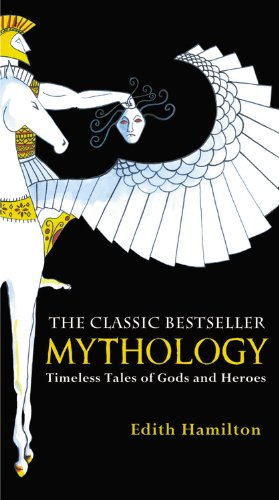I've been interested in Mythology since I was a kid, but I never got to read the original texts or any books about it. I did spend some sleepless nights devouring the information at Wikipedia, first on Egyptian, then Greek and Roman and finally even on Norse myth. Knowing this a friend lent me Edith Hamilton's book and I read it as soon as I could, coincidentally, at the same time I read the first half of Neil Gaiman's American Gods, a very original modern take on myth.
Mythology: Timeless Tales of Gods and Heroes proposes to give the reader a walk through the most important myths drawing as possible directly from the texts and original authors that brought their knowledge to later civilizations. Examples as Homer, Virgil, Ovid and Euripides are surely known to most people that are interested this theme. I was a bit disappointed to find out that it was mostly about Greek and Roman mythology, I'd have enjoyed reading more about others but this by no means kept me from enjoying it. The author covers a lot of what is known, ranging from creation myth to specific stories of gods and human heroes, including of course the epics as the Quest of the Golden Fleece, the Iliad, the Odyssey and the Aeneid but is by no means limited to those. In fact, some of my favourites were short ones about lesser gods or humans' not at all epic as for example Biton and Cleobis'. The way Edith Hamilton decided to transmit these stories is also quite interesting. At the start of each chapter she talks about the poets who first wrote those specific tales, which were the ones she decided to use as source and why, whether it was because they were the most complete or because she likes their style best. As she writes, she adapts most of the original texts, adds some quotes, comments, interprets and gives context to the tales. Although the beginning feels slow and at times confusing, as one continues it enthrals the reader and becomes easier and pleasurable. The last part of the book is the small introduction to Norse Mythology, with some stories and the identification of the main characters, while at the same time comparing it to the Greek and to humanity itself, showing it as a more sombre myth, frustrating and simultaneously somewhat conformed to the hardness of life and inescapable death.
More than only getting to know the classic mythologies, this book allows one to peek into the minds of the Greek and Roman people, notice the evolution of the stories and feel the belief fading as they are told by more recent authors. One thing that came to mind often is how human centred they are, how the gods end up behaving pretty much as humans do, being petty, loving, hating, envying, powerful and immortal as they are. The Norse gods seem to me more inspiring, probably because, not being omnipotent - themselves just living until Ragnarok, when they are sure to be defeated and die - they are more similar to humans and would probably help people fight through their lives, face the problems to which they found no solution, giving them purpose, even if it's not fighting for a blissful eternity as nowadays more prominent religions came up with. I must say though that I still have much to read and find out about the Mythology of the Norsemen.
Overall, Mythology: Timeless Tales of Gods and Heroes is good as a first look into the theme, interesting enough for those that already know some of the stories but want a closer look and an organized source and is probably even good to keep as a myth encyclopaedia to peek into it once in a while.

I enjoyed this book and read it just in time about the characters poseidon, hades ect with the new movies coming out the titans and the lightening thief ect. I knew what they were talking about felt alittle smarter for an old broad...lol.. and it took me to another place..its a good read to escape the real world.
ReplyDelete